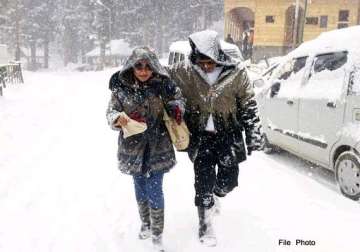Kashmir valley freezes under 'Chillai Kalan'; Kargil coldest
Srinagar: A week after the advent of 'Chillai-Kalan'—the 40-day period of harshest winter, the weather in Kashmir valley continues to remain dry and cold with minimum temperatures hovering below the freezing point.Kargil was the coldest

Srinagar: A week after the advent of 'Chillai-Kalan'—the 40-day period of harshest winter, the weather in Kashmir valley continues to remain dry and cold with minimum temperatures hovering below the freezing point.
Kargil was the coldest place in the state recording a low of minus 15.6 degree Celsius.
"The weather continues to be dry and cold especially in plains and there will be no large change in it over the next few days," a MET Department official said.
Kashmir Valley and Ladakh region have been experiencing bone-chilling cold with no major respite in the harsh climatic conditions as the weather continues to remain dry due to the absence of rains or snowfall in the plains.
Few places in the Valley, including the famous ski-resort of Gulmarg, had received light snowfall on December 22. The night temperatures in the Valley and Ladakh region continue to remain several degrees below the freezing point.
Srinagar, the summer capital of Jammu and Kashmir recorded a minimum temperature of minus 4.1 degree Celsius, slightly above than the previous night's minus 4.7 degrees, the official said.
The city had witnessed the coldest night of this winter so far with mercury plunging to minus 5.6 degree Celsius on December 27. Severe cold had led to freezing of parts of many water bodies including the famous Dal Lake located in the heart of the city.
Qazigund, the gateway town to Kashmir Valley in south Kashmir, recorded a low of minus 5.8 degrees Celsius against the previous night's minus 6.4 degrees Celsius, the official said.
He said mercury in Pahalgam tourist resort in south, which serves as a base camp during the annual Amarnath yatra, settled at a minimum of minus 7.0 degree Celsius against minus 7.6 degree Celsius the previous night.
Gulmarg in north Kashmir recorded a low of minus 3.4 degree Celsius, slightly up from the previous night's minus 3.7 degrees Celsius, the official said. Kupwara town in north Kashmir settled at minus 5.8 degree Celsius, while Kokernag in south registered a minimum of minus 4.2 degree Celsius, he said.
The minimum temperature in Leh, in the frontier Ladakh region, appreciated slightly to settle at minus 15.4 degrees Celsius, compared to the previous night's minus 17 degree Celsius, he said.
Kargil recorded a low of minus 15.6 degrees Celsius, compared to minus 15.2 degrees Celsius the previous night and was the coldest recorded place in the state, the official said.
He said mercury in Pahalgam tourist resort in south, which serves as a base camp during the annual Amarnath yatra, settled at a minimum of minus 7.0 degree Celsius against minus 7.6 degree Celsius the previous night.
Gulmarg in north Kashmir recorded a low of minus 3.4 degree Celsius, slightly up from the previous night's minus 3.7 degrees Celsius, the official said. Kupwara town in north Kashmir settled at minus 5.8 degree Celsius, while Kokernag in south registered a minimum of minus 4.2 degree Celsius, he said.
The minimum temperature in Leh, in the frontier Ladakh region, appreciated slightly to settle at minus 15.4 degrees Celsius, compared to the previous night's minus 17 degree Celsius, he said.
Kargil recorded a low of minus 15.6 degrees Celsius, compared to minus 15.2 degrees Celsius the previous night and was the coldest recorded place in the state, the official said.
'Chillai-Kalan', which begins with Winter Solstice on December 21, is the period when the chances of snowfall are maximum and most frequent. The weather remains cold during this period as the day temperature also dip drastically, freezing most of the water bodies including the famous Dal Lake.
Though 'Chillai-Kalan' would end on January 31, the winter continues after that. The 40-day harshest period would be followed by a 20-day long 'Chillai Khurd' (small cold) and a 10-day long 'Chillai Bachha' (baby cold). PTI SSB MIJ NDC 'Chillai-Kalan', which begins with Winter Solstice on December 21, is the period when the chances of snowfall are maximum and most frequent. The weather remains cold during this period as the day temperature also dip drastically, freezing most of the water bodies including the famous Dal Lake.
Though 'Chillai-Kalan' would end on January 31, the winter continues after that. The 40-day harshest period would be followed by a 20-day long 'Chillai Khurd' (small cold) and a 10-day long 'Chillai Bachha' (baby cold).